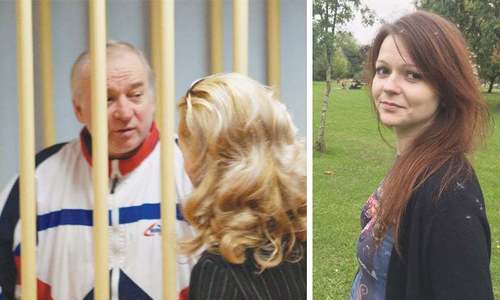Russia said on Saturday that Britain had to reduce its diplomatic staff by more than 50 more people as a crisis in ties between Moscow and the West escalated over the nerve agent attack on a former spy.
The new measures came after 23 British diplomats left Russia earlier this month and are seen as Moscow's punishment after Britain's allies expelled Russian diplomats over the March 4 poisoning of former double agent Sergei Skripal and his daughter Yulia in an English city.
“Russia suggested parity. The British side has more than 50 more people,” foreign ministry spokeswoman Maria Zakharova told AFP.
On Friday, Moscow summoned British ambassador Laurie Bristow, giving London a month to cut the number of diplomatic staff in Russia to the same number Russia has in Britain.
He was summoned along with the heads of diplomatic missions from 23 other countries who were told that some of their diplomats had to leave, in the biggest wave of tit-for-tat expulsions in recent memory.
Bristow had been handed a protest note over the “provocative and unfounded actions of the British side which instigated the unwarranted expulsion of Russian diplomats from a variety of states,” the Russian foreign ministry said.
In London, a Foreign Office spokeswoman said on Saturday: “We are considering the implication of the measures announced yesterday by the Russian foreign ministry.” The Foreign Office had said it regretted the most recent developments but insisted Russia was the culprit.
“This doesn't change the facts of the matter: the attempted assassination of two people on British soil, for which there is no alternative conclusion other than that the Russian state was culpable,” it said.
More than 150 Russian diplomats have been ordered out of the US, EU members, NATO countries and other nations.
On Friday, Russia expelled diplomats from 23 countries ─ most of them EU member states ─ in retaliation against the West.
France, Germany, Canada and Poland each said that Russia was expelling four of their diplomats. Other countries including Australia, Ukraine, the Netherlands, Sweden, the Czech Republic, Finland, Lithuania and Norway were also told to pull their envoys.
Russians set to leave US
In the United States, 60 Russian diplomats expelled by Washington prepared on Saturday to leave the country.
In total, 171 people ─ diplomats which Washington alleges are “spies” and their families ─ were set to leave the United States, Moscow's envoy Anatoly Antonov told Russian reporters in Washington.
The Russian government provided two planes for the evacuation and one of them will make a brief stopover in New York to collect 14 families, he added, according to TASS state news agency.
US media showed footage of a Russian government plane on the tarmac at Washington's Dulles airport, apparently getting ready to take the expelled Russians home.
Britain has said it is “highly likely” that Russia was responsible for the Skripal attack using the Novichok nerve agent developed in the Soviet Union, but Russia has angrily denied any involvement.
Britain has suspended high-level diplomatic contact with Moscow and said it would not be sending any members of its royal family to the 2018 football World Cup hosted by Russia.
Russia responded by expelling 23 British diplomats, closing a British consulate in Saint Petersburg and halting the activities of the British Council educational and cultural organisation.
Access to Yulia Skripal
Britain said Saturday it was considering Moscow's request for consular access to Yulia Skripal, while taking into account her wishes.
The 33-year-old came out of critical care on Thursday and was “improving rapidly”, said Salisbury District Hospital.
She is now in a “stable” condition ─ with the BBC reporting that she was conscious and talking.
“We are considering requests for consular access in line with our obligations under international and domestic law, including the rights and wishes of Yulia Skripal,” a Foreign Office spokeswoman told AFP.
Sergei Skripal, 66, remains in a critical but stable condition.
Skripal sold secrets to Britain and moved there in a 2010 spy swap. His daughter was visiting from Russia.















































